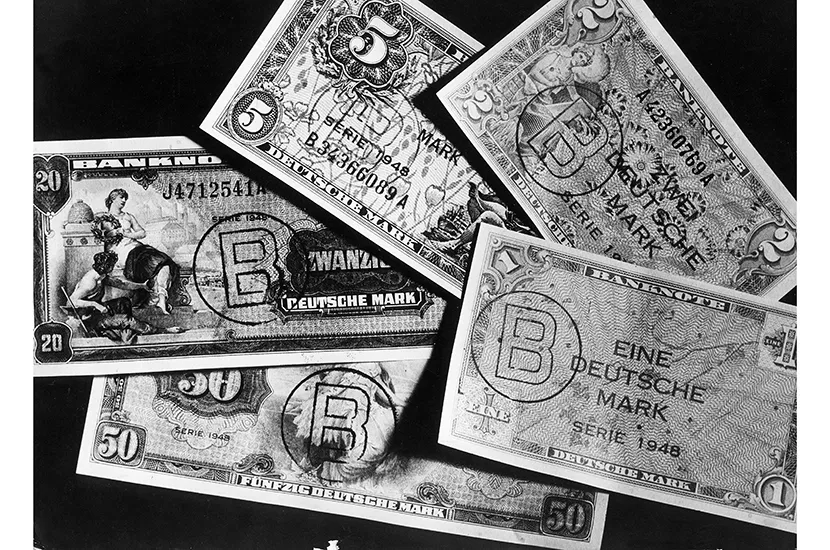The International Monetary Fund (IMF) was established in 1944 at the Bretton Woods Conference to stabilize international financial systems and promote economic recovery after World War II. The IMF provides financial assistance, policy advice, and economic monitoring to countries in need, ensuring global monetary cooperation.
In the post-World War II era, the IMF played a crucial role in rebuilding war-torn economies, particularly in Germany and Japan. These two nations underwent extensive economic reforms, supported by international financial aid, to transition from devastated states to industrial powerhouses.
Topics and Relevance
Recovery Process of German and Japanese Economies After WW2
The post-war recovery of Germany and Japan required massive economic restructuring, international financial support, and strategic planning. While the U.S. implemented the Marshall Plan in Europe, Japan benefited from economic policies led by the IMF and the U.S. Occupation authorities.


Delegates in this committee will explore the financial policies that led to Germany’s economic miracle (Wirtschaftswunder) and Japan’s rapid industrialization. Should the IMF have imposed stricter conditions on financial aid? Could alternative strategies have accelerated economic recovery? This debate will address the IMF’s role in shaping modern economic superpowers.
Rules of Procedure
1. Roll Call
- The Chair will call the roll to confirm attendance.
- Delegates (representing countries) should respond with “Present” or “Present and Voting.”
2. Opening Remarks
- The Chair will provide a brief overview of the committee’s agenda and objectives.
- Delegates will be reminded of the Letter of Intent process and the flow of debate.
3. Submission of Letters of Intent
- Delegates will submit their Letters of Intent to the IMF Board (the Chair and committee staff) for approval.
- The Letter of Intent should include:
- A formal request for financial assistance.
- Background context on the economic or fiscal challenges faced by the country.
- Specific details on how the funds will be used (e.g., percentages allocated to different sectors).
- A repayment plan (interest rate, grace period, and repayment period).
4. Presentation of Letters of Intent
- Once approved, delegates will present their Letters of Intent during the General Speakers List.
- Each delegate will have a set time (e.g., 2-3 minutes) to present their case to the committee.
5. Question and Answer (Q&A) Period
- After each presentation, there will be a Q&A session where other delegates can raise concerns or ask questions.
- The presenting delegate must respond to questions and clarify their proposal.
6. Moderated Caucus
- After all Letters of Intent have been presented, the committee will move into a Moderated Caucus to discuss the proposals.
- Delegates can propose specific subtopics for discussion (e.g., climate change, debt relief, economic reforms).
- Speaking times will be set by the Chair (e.g., 1-2 minutes per speaker).
7. Amendments to Letters of Intent
- If delegates wish to modify a Letter of Intent, they can motion for an Unmoderated Caucus to draft amendments.
- During the Unmoderated Caucus, delegates will collaborate to propose changes to the Letter of Intent.
- Amendments can include adding, removing, or modifying clauses in the letter.
8. Presentation and Voting on Amendments
- After the Unmoderated Caucus, delegates will present their proposed amendments.
- The committee will vote on each amendment. A simple majority is required for an amendment to pass.
9. Final Voting on Letters of Intent
- Once all amendments have been voted on, the committee will proceed to a final vote on the Letter of Intent.
- If the Letter of Intent passes, the IMF will approve the financial assistance request.
- A simple majority is required for the Letter of Intent to pass.
10. Closing the Session
- The Chair will summarize the committee’s decisions and announce which Letters of Intent were approved.
- Outstanding delegates may be recognized for their contributions.
Flowchart Summary
Final Voting on Letters of Intent → Closing the Session.
Roll Call → Opening Remarks → Submission of Letters of Intent.
Presentation of Letters → Q&A Period → Moderated Caucus.
Unmoderated Caucus (for amendments) → Presentation and Voting on Amendments.


